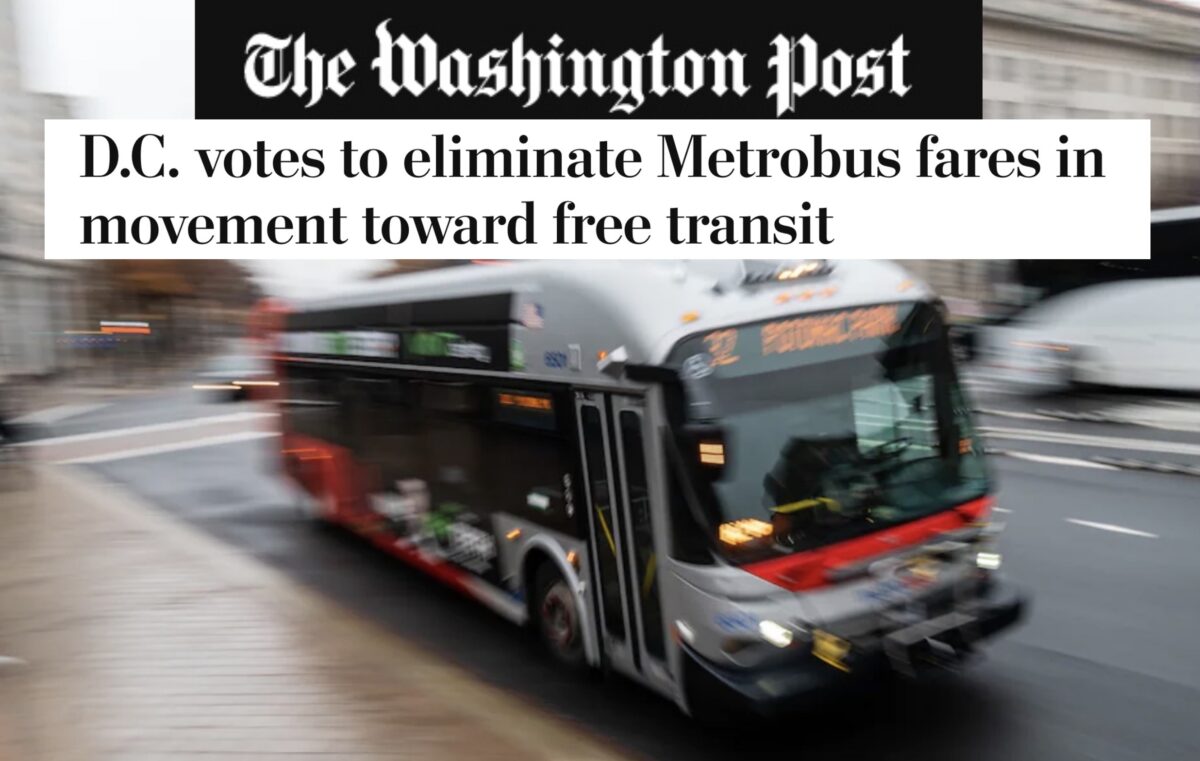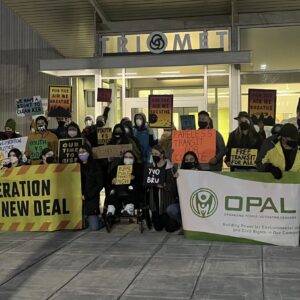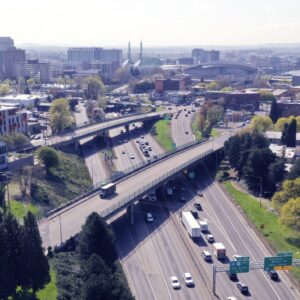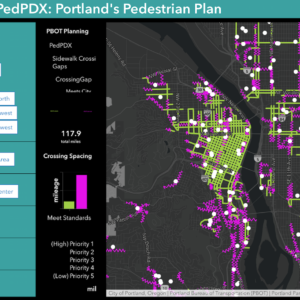On Tuesday night the Washington D.C. city council voted to eliminate fares on its bus service, becoming the largest U.S. to do so. It’s a huge step forward for transit users and should encourage more people to get on the bus at a time when ridership is still in recovery mode following peak pandemic.
Here’s more from the Washington Post:
“The D.C. government will subsidize bus rides within the city limit starting July 1, allowing passengers to board free. The council also expanded bus service round-the-clock on several of the transit system’s busiest routes to help late-night service workers… The cost of the program is estimated at $42 million.”
D.C. is similar in size to Portland (670,000 to our 640,000), but our cities are very different. For starters, D.C. is much more compact and densely developed. But while the culture and landscape differs, much of the political impetus to support free transit should be relatable to Portlanders.
One council member who voted yes said the benefits include, “removing cars from the road and speeding up bus transit” — the exact same goals as the City of Portland’s Rose Lane Project.
In D.C., business leaders have come forward to support the move. One representative of a restaurant lobby group said free transit, “Is really important for the revitalization of downtown, where the pandemic’s effects are being felt every day.”
Portland business leaders have made similar statements about the need for a downtown renaissance, but they have not publicly supported transit — much less advocated to make it free. Unfortunately, some business leaders have strongly opposed projects that increase access to their stores for customers on buses and other non-car vehicles.
For their part, TriMet is headed in the opposite direction. As we reported last month the agency plans to make their first fare increase in a decade. TriMet’s efforts to boost bus service by 30%, announced a few months before the fare increase, appears to be a case of one step forward and two steps back.
In response to TriMet’s fare increase plan, Portlander Mary King wrote an opinion in Street Roots urging TriMet to eliminate them altogether. King said such a plan could be funded by increasing the payroll tax by 1% on high salary earners (starting at $175,000 to $200,000) and up to 2% on people who make at least $350,000 a year. “To get a sense of what these tax scenarios could raise,” King wrote in the op-ed, “[Oregon State] Representative Khanh Pham asked the state Legislative Revenue Office for estimates. They projected that these small increases in the payroll tax would bring in $145 or $165 million in 2023 — depending on the details — and $8 to $10 million more in 2024.”
Portland desperately needs more tools to reduce the amount of car trips. Free — and more widely available — transit is a major step we have to take in order to implement already-adopted environmental and transportation plans. But as local agencies ratchet up efforts to achieve this widely accepted goal, influential voices are using the lack of transit access as a reason to maintain our car-oriented system (“The only option available to people in my district is a car,” is what I’ve heard several local elected official say in recent meetings).
One way to respond to that argument is to make buses more accessible and affordable to everyone.
— Read more about D.C.’s free transit news at WashingtonPost.com.








Thanks for reading.
BikePortland has served this community with independent community journalism since 2005. We rely on subscriptions from readers like you to survive. Your financial support is vital in keeping this valuable resource alive and well.
Please subscribe today to strengthen and expand our work.
Possibly a more interesting figure on population would be the metropolitan area:
Portland–Vancouver–Hillsboro, OR–WA Metropolitan Statistical Area: 2,512,859Washington metropolitan area: 6,385,162
stats from wikipedia: https://en.wikipedia.org/wiki/Washington_metropolitan_area https://en.wikipedia.org/wiki/Portland_metropolitan_area,_Oregon
Welcome to all newcomers to Portland! We used to have free transit in Portland as well.
If we remove obstacles to those who could choose transit, we will have fewer single occupancy vehicle drivers on the road. Safer for all. We subsidize private vehicle ownership in this city SO MUCH.
If we added public parking fees on Hawthorne, Alberta, Mississippi, Belmont, and elsewhere, we’d have more than enough money to provide free transit to all city wide with enough monies for expanded service.
If only we didn’t have a voting block of Ted, Dan, Mingus, and Rene who would never support this.
I’ll assert that fares are not an obstacle to those who could use transit but choose not to. The reason half as many people ride today as they did pre-pandemic are related to the perception of safety and cleanliness (and, secondarily, reliability and wait times). Eliminating fares without addressing those core issues will not convince people to return to TriMet.
As a historical note, the reason we got rid of the fareless square was that it facilitated drug dealing and other criminal behavior.
Fares are not an obstacle to YOU. But they are to me and many others. If I can take a direct bus from my home to where I am going, quickly and conveniently, I still might choose to drive to avoid having to pay fare for me, my partner, and our kids. Plus, I don’t have to pay for free parking at my home, or at my destination. Driving is heavily subsidized. Transit should be fareless.
And your reason for getting rid of fareless square is not why we got rid of fareless square.
And now that we don’t have fareless square any longer, are you saying that we got rid of drug dealing and other criminal behavior?
Not saying that, I was just repeating what we were told when the fareless square was removed (that wasn’t the only reason — there were issues with fare enforcement and too many riders making short hops — but it was the most memorable, and is a good illustration of the types of unexpected issues that arise when you eliminate fares).
I will say that behavior once considered beyond the pale now seems almost quaint. I have seen drinking and smoking on recent Max rides, and no one batted an eye.
What a grippingly unique proposition. Why not make it a 5% increase to income taxes, then we could pay people to ride Trimet. Talk about a Portland style solution.
I’d love free bus service, but really I do not trust TriMet to run it well. I mean we have like 30% service reductions on most major routes since 1998 (check out this site for some fun transit history – http://www.rosecitytransit.org/trimetarchives/other/1998schedules/).
I don’t really know what needs to change at TriMet, but the current bus service patterns are not good. I could go on an entire rant about how bad the “frequent service” designation has gotten – let’s take a quick glance at the #15 (https://trimet.org/schedules/w/t1015_1.html) service to the Belmont/Cesar Chavez stop – a very important transfer stop to the 75. There are 63 buses that hit this stop every weekday going towards Gateway – but only 44 of those operate at a “15 minute or better” headway (from about 7 am to 7 pm – but it’s not uncommon to have a random 16 or 17 minute headway sprinkled in throughout the day).
But in 1998, every single bus from 7 am to 9:45 PM came at 15 minute or better of a headway, with the average being about 11 minutes (78 total buses – with 87 total on the day). We don’t have a single transit service in the city that gets peak service that good anymore. And that’s a 27.5% decline in service too!
TriMet spends a lot of money asking consultants why they’ve had bad post-pandemic ridership recovery, but anyone who takes one look at schedules from 30 years ago and today understands. 15 minutes is just not that good of frequency, and our middling post-pandemic ridership recovery numbers strongly reflect that.
Great resources…did you / they control the data for any service hours shifted over to more MAX routes since 1989 and thus likely the most frequent / constant under 15 minute headways are now MAX lines? (Just a guess.)
Well most MAX lines operate on somewhat similar service patterns to the 15 (the Orange line is particularly bad for headways and span of service). Granted, they do move 4x more people per transit vehicle so it’s an improvement on the approximate alignments they replaced. The issue here is that there is no MAX service that really compares to the frequent buses on the east side main streets (15 on Belmont, 14 on Hawthorne, 9 on Powell, 17 on Holgate, 19 on Woodstock, FX2 on Division, etc.) and they have seen very dramatic service loss in the last 30 years (well the FX2 has of course recently seen service improvements, and the 9 is about the same – but 2/6 is still not great!).
So the MAX has led to more resources being spent on commute-focused (almost every MAX route was justified as getting suburban folks into the central city faster), rather than the more flexible, durable bus routes in the denser East side neighborhoods. I’d probably have to look more closely at the NTD for service hour changes to get a more clear picture of this though.
I’m hoping they go through with these changes:
https://news.trimet.org/2022/09/lets-move-forward-together-and-redesign-trimet-bus-service/
Yeah, I think those are good. But the real detail that matters is the schedules themselves. I don’t really buy TriMet’s “Frequent Service” moniker as a stand in for quality service
I’d love to be able to board the MAX for free!
That said, given the serious costs noted in the article, shouldn’t we be prioritizing regularity and reliability of service? The main reason I can’t count on MAX to get to work is because of the disruptions to its regular service. I literally had to call my wife and get a ride to work last week because trains were stopped due to a “medical situation” in a different neighborhood. Being late to work is not an option. It is embarrassing and my pay gets docked.
If we’d like to avoid a ridership death spiral, we need to make transit a viable alternative. In a world of unlimited funding, I’d be in favor of free transit. But in the world we actually live in, we need to turn drivers into transit riders, and voters into pro-transit voters. That won’t happen unless transit is reliable.
As much as I like to rag TriMet for service disruptions (a train having mechanical issues 30minutes out of the yard? Not running a Type 1 with an ice cutter as the first car down to Clackamas this last Monday?) – an emergency in front of the train that stops service all the way up the line is one of the inherent issues with rail.
Monday I ended up hopping off at Fuller road and racing the train – it nearly caught me on one section shortly before the sound baffles started, then the ice got too bad and I pulled away. Beat it handily past the platform at CTC.
Doing whatever it takes to increase their number of operators and personnel to make the trains safe is the first thing they have to do. In the absence of that, free transit will just cause MAX to become a rolling homeless camp as it was in the early days of the pandemic.
Bad enough that I frequently smell/taste meth being smoked on the car I’m on (last night being the most recent).
So, instead of investing an extra $42 million a year into improving bus service, they’re making the current service free.
So the bus system is Metrobus operated by Washington Metropolitan Area Transit Authority (WMATA). Metrobus covers DC. Maryland and Virginia. The operation area is 1500 sq. miles. The free transit area (Washington DC) is only 61 sq. miles. So the $42 million is what DC will pay VMATA for the free transit inside city limits.
So if ride the bus to and from work in DC but live outside of the city limits. You will have to pay for your trip in, but your trip home will be free.
Note the word “subsidize.” DC is still charging for transit, particularly on the extensive subway network, its small streetcar system, and for paratransit, all of which have probably seen increases in ridership, but the bus which is still losing ridership is being subsidized to the point that it will be free. If the whole system was “free” the cost would be prohibitively high, far more than $42 million per year.
The real question here is whether $42 million is better spent improving transit service frequency, span, etc, versus spending $42 million to eliminate fares. Which one would actually increase ridership significantly and make it a more useful service? I think the evidence points more toward service frequency and span than reducing transit fares. The cost of transit is not a large barrier for most people, and not the thing that’s keeping them from riding. It’s that transit is not a useful enough service for them to use. This doesn’t do anything to make it more useful. I think fares should be free for low-income households, as a good equity move, but making it free for everybody is wasteful and not as effective as improving the service.
Trimet could also utilize the funding model that the City of Corvallis does. A utility fee of $10 per month per household would allow all Portlander’s to prepay their fares rather than doing so at the time of boarding. By doing this you create a situation where everyone is investing in our transit system, and any household that utilizes transit for more than 2 trips per month will be saving money vs the current state of things. Right now the marginal cost to travel for a family of four is often more when taking transit than driving, prepaid fares ensure that transit will always have a lower marginal cost.
Note for the average BP reader: many PNW / Calif cities have relied on shifting higher inflationary and ‘other’ costs to muni utility services (potable water, power etc.) since the ‘Prop13 rebellion’ of the 1980s capped [non sales based] property tax increases to a fixed low inflation rate max.
And boy what a big deal it was when it happened. Peter Navarro began his political career railing against rate and fee hikes.
I believe Trimet’s statutory authority for revenues is limited to the payroll tax. And that itself is limited to ~0.8%
Jonathan failed to point out the differences between Washington DC & Portland when it comes to transit as well. I have extensively ridden transit in both cities frequently and the idea of free transit will fall flat on its face in Portland unless the criminal issues are dealt with.
The criminal element and lack of security for transit riders in Portland is keeping potential riders away in droves. Washington DC’s Metrorail & Metrobus systems are inherently safer because of transit police presence, enforcement of criminal activity and most importantly prosecuting those who violate others. Is it 100% safe? Nothing is. Is it miles ahead of Tri-Met & the City of Portland when it comes to protecting transit riders so they “feel” safe? A thousand times YES!
Perhaps this is true for WMTA routes but not for the exterior plazas at Union Station – which became pretty lawless in 2017 to 2018 before we closed the DC Bikestation there – and has continued to be lawless from what I read in the press post pandemic.
? I was just there about a week ago and it was just a normal train station exit. Lots of people in transit/moving about, but certainly not some chaotic, lawless place. Not sure what you’re reading
I keep seeing this critique of Trimet, but it rings very hollow for me. Portland’s is the cleanest and safest system I’ve used domestically except for DC. I think we have a bit of a base-rate effect going on with Trimet.
Wow Will I’d sure like to know what Trimet bus lines or MAX trains you’re riding & at what times because I’ve witnessed dozens of altercations on both buses & MAX trains pre-Covid and in the midst of Covid. A lot of homeless altercations, mental illness yelling, substance abuse and just plain old thugs. That’s not stereotyping. That’s what I’ve witnessed with my own two eyes. Everyone knows there is little to no enforcement right now on any Trimet bus or train. You must just be one of the lucky few who avoids any unpleasantries.
I’ve seen some of that stuff happen, sure, but compared to other systems I’ve been on in the US, Trimet has felt both cleaner and safer to me.
I was in Boston recently, and while their system has its problems, it feels significantly safer and cleaner than TriMet.
Which systems feel more dangerous?
BART, Chicago, NYC, LA are all pretty rough in my experience.
Will, I take transit a few times a month, not a large sample size, but I’ve also not seen any of the crazy stuff people are endlessly going on about. I can’t compare it to other transit systems but all my trips here are very mellow.
Out of curiosity, which other systems have you used? I was just in Seattle last month and their busses were cleaner, service was more frequent, and a much higher percentage of the riders appears to be “choice” riders, rather than necessity riders. This is similar to what I’ve seen in Miami, Boston, etc.
Los Angeles was worse, I’ll give you that.
I’ve used Chicago, SF/BART, and LA extensively and NYC a few times pre-pandemic. All I would say are less clean and safe feeling than TriMet.
NYC subways are old and loud which creates a general sense of things being run down.
This is the most straight forward and obvious thing every city should be doing. It’s great to hear a bigger city like DC doing it! I hope Portland takes this as an example.
I don’t know that much about Trimet, but as far as I know raising fares is really their only tool to increase funding, so I don’t really blame them. They can’t choose to make transit free, that’s something we have to fund. I just hope we do. While we’re at it maybe turn it into a public owned company as private business and profits have no place in something like public transit.
A fare-free transit service may not be as heavy of a financial lift, as the Mary King / StreetRoots op-ed analysis proposes…for the adopted 2023 TRIMET budget, they are now only planning to collect 7% of revenue from the farebox. [This does not account for any operations and financial cost savings for not having to collect these fares.] This $62m is much lower than the $145m estimated collected by King, which would allow for investment into the system or… paying folks to ride the system, as some have suggested. [Other regional transit systems like CTRAN collect even lower proportion of farebox revenue: 2% to 3%.]
What may be the real “heavy-lift” is the historical preference by most US transit agencies to move buses vs moving people, AND to use fare collection as a form of policing / exclusion from the system by chronic problem users.
i’m currently visiting Las Vegas. You can’t board a bus there unless you pay the fare. NO FREE RIDERS. Given the choice of ‘free transit’ and ‘you pay your fare or you don’t ride’ . . . i’ll take the latter.